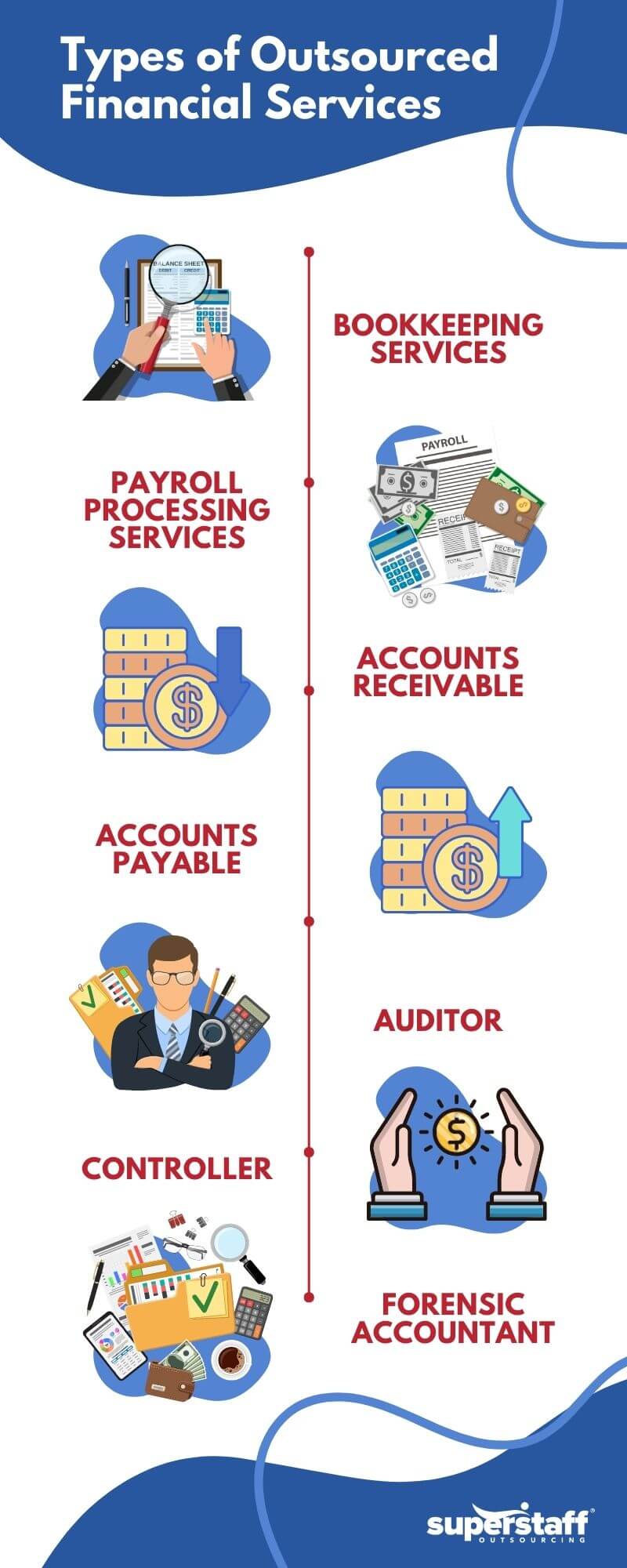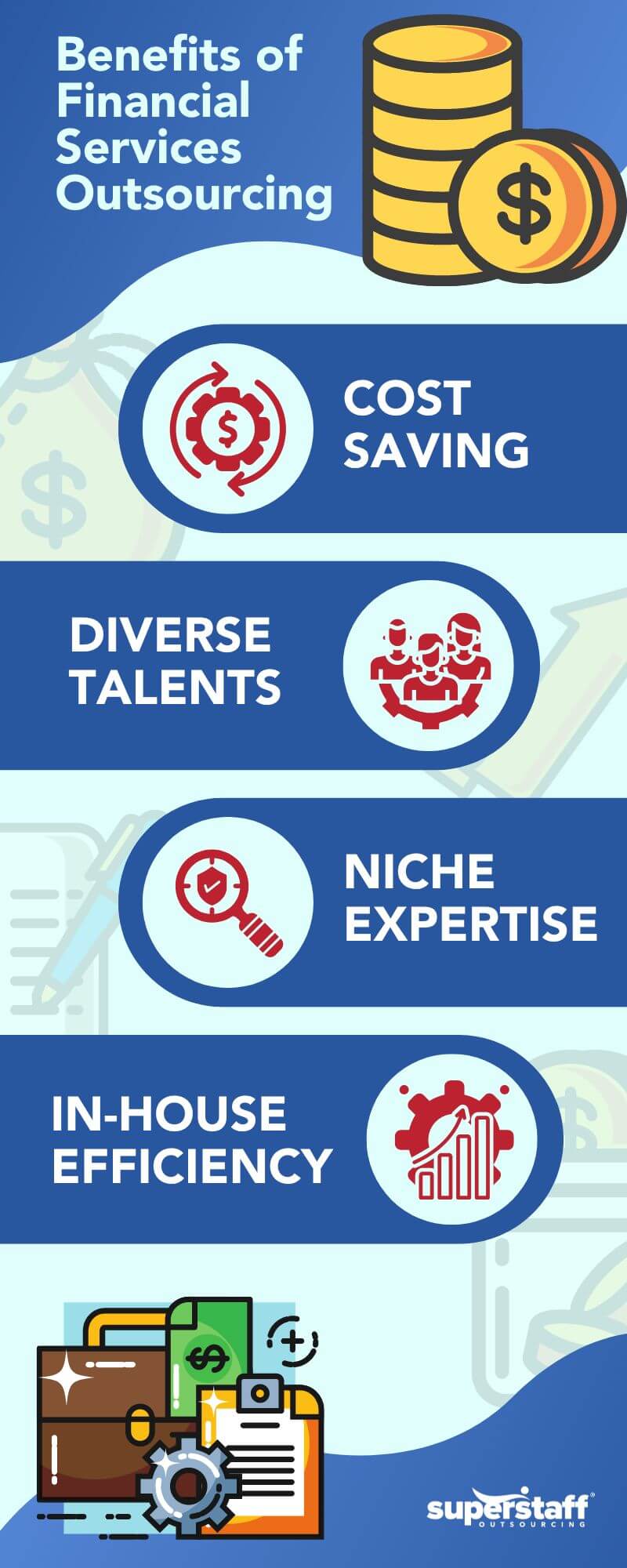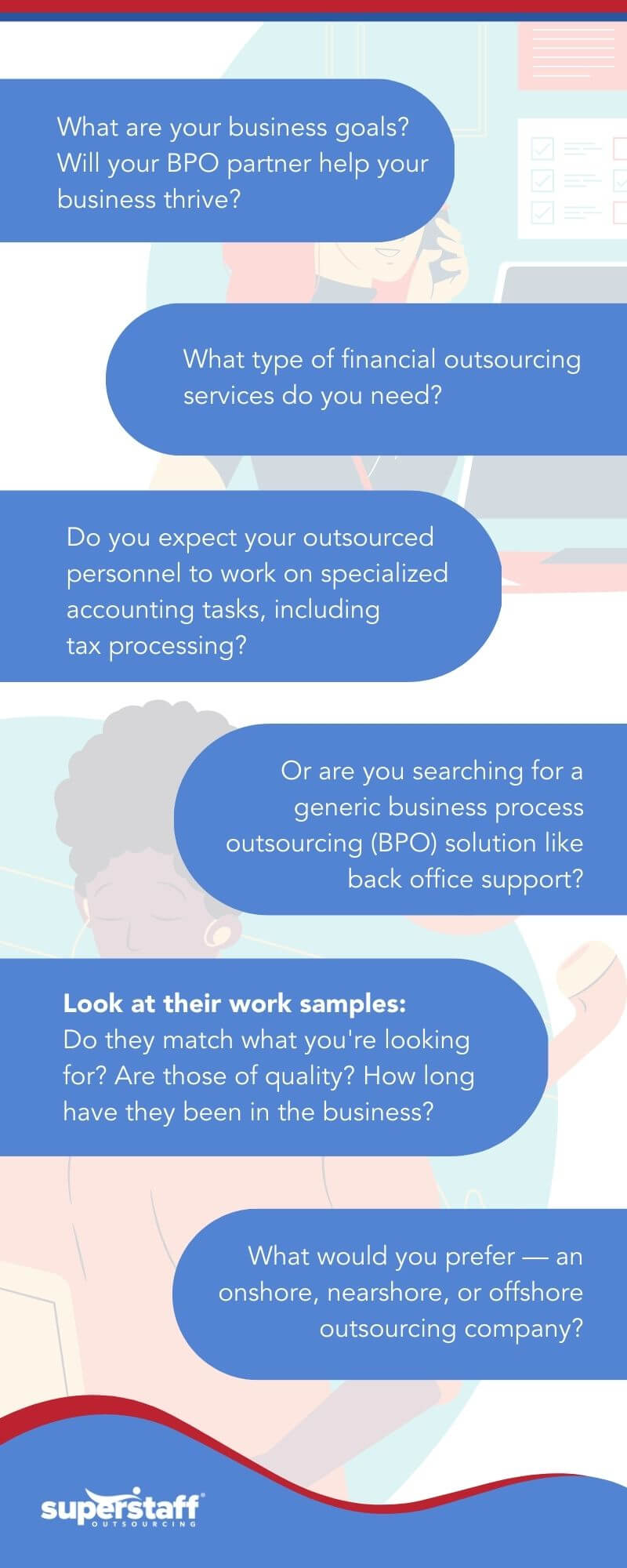
Managing finances is one of the most crucial aspects of running a business. After all, staying on top of financial matters allows companies to create a budget plan for the future, evaluate business performance, and maximize assets and resources.
However, some business owners may struggle to deal with the more complex and specialized financial functions, especially when they’re already swamped with other, just-as-crucial business responsibilities. In these cases, financial services outsourcing may be the ideal solution.
Suppose you’ve always been curious about how financial outsourcing works and its advantages to businesses; you’re in luck. We’ll answer some of the most common questions about this outsourcing solution. Let’s dive in!
Questions (and Answers) About Financial Service Outsourcing
1. What is financial service outsourcing?
Outsourcing financial services involve hiring third-party providers to handle finance and accounting functions. Instead of hiring, training, and maintaining an in-house team of financial professionals, businesses can acquire financial services from experienced and trained BPO providers specializing in accounting services, bookkeeping, financial analysis, and other back-office tasks.
2. What are the key advantages of outsourcing financial services?
Financial outsourcing offers a wealth of benefits for companies. Since accounting services and cash flow management processes require significant experience and expertise, business owners can outsource these functions to a capable and reliable team and instead focus on doing what they do best.
In addition, outsourcing financial services enables companies to improve their operational resilience. BPO providers offer scalable solutions, which allow businesses to upgrade or downsize their operations as needed, creating a barrier that future-proofs and protects the company from market volatility or other unforeseen circumstances.
3. What types of financial services are commonly outsourced?

- Bookkeeping Services: Most entrepreneurs hope for successful, secure, and scalable business operations. But there’s one way to guarantee this: by hiring specialists in bookkeeping. It is an outsourcing solution where businesses allow third-party bookkeepers to record and organize a company’s financial transactions into a ledger. The best bookkeeping services will provide you with financial reporting, including an accurate monthly snapshot of your firm’s financial statements.
- Payroll Processing Services: In this financial outsourcing solution, BPO providers assist companies with payroll processing, including salary calculations, employee taxes, and labor law compliance.
- Accounts Receivable: This service centers around invoicing, calculating and producing statements, reconciling the general ledger, financial reporting, and settling any misstatements or questions regarding your clients’ unpaid dues.
- Accounts Payable: This outsourcing service helps manage invoice or bill-related transactions of the goods and services credited by your company. Other functions of this business practice include invoice capture, purchase order (PO) matching, and archiving documentation.
- Auditor: Hiring remote auditors for your firm provides you a reasonable assurance about whether your financial activities contain any irregularities—either from fraud or error. In addition, they can also enhance the effectiveness and efficiency of your risk management strategies and organizational procedures.
- Controller: They manage your books, ensuring that they’re constantly updated in a timely manner. Ultimately, their main objective is to present you with sophisticated financial reporting and track your financial information.
- Forensic Accountant: You can also outsource a certified public accountant to assess financial data and accounts that could be used as evidence in the future in case of fraudulent activities.
Read More: Understanding the 7 Different Types of Outsourced Financial Services
4. Do banks outsource financial services?
Yes. Banks and other lending institutions are often the organizations most likely to outsource the financial services industry. Banks outsource to cut costs, improve online capabilities, and access specialized resources and expertise.
5. What other industries outsource financial services?
Banks and lending institutions are organizations commonly outsourcing financial services. However, other industries also benefit from this outsourcing solution. After all, every business, no matter the specific industry, needs accurate accounting and bookkeeping to maintain its operations.
Examples of industries that opt for this service outsourcing include dental practices, retail stores, restaurants, electrical contracting companies, and trucking and automotive businesses.
Some industries may also require specialized outsourced financial services. For instance, insurance companies may need help with claims processing and policy management, while real estate agents may require accounts receivable and sales support solutions.
6. What is the global market size for financial service outsourcing?
The demand for outsourced financial services grew during the COVID-19 pandemic and showed no signs of slowing down. In 2020, the global accounting and financial outsourcing market was valued at $37.9 billion, and industry analysts predict that this number will continue to rise to $53.4 billion by 2026.
In the U.S. alone, the financial outsourcing market is estimated at $18.3 billion, accounting for a 45.7% global market share. These numbers showcase how more and more companies are discovering the advantages of outsourcing financial functions.
7. How does a BPO company provide financial service outsourcing?
BPO companies access a large talent pool of professionals who can take on various tasks and functions. The ideal financial outsourcing provider can handle back office support functions, recruitment and hiring, and knowledge process outsourcing, such as accounting, data analysis, or online banking programming and development.
8. Where do BPOs pool professionals for financial outsourcing?
Mostly, BPO companies can hire financial service outsourcing professionals from anywhere in the world, onshore or offshore. By partnering with outsourcing providers in the Philippines, U.S. companies can achieve financial health and grow their business with the help of our highly educated and proficient Filipino Certified Public Accountants.
The Philippines is home to many finance and accounting graduates and professionals. With various skilled specialists in the BPO industry, they could deliver cost-effective and sound financial outsourcing services to businesses of all sizes, from growing startups to Forbes-ranked enterprises.
Bonus Read:
What Are Other Benefits of Financial Services Outsourcing?

1. Enjoy Cost Saving Opportunities
Unsurprisingly, hiring in-house employees, or a finance department, can be expensive. But there’s a great alternative for this: outsourcing financial services. With this means, paying full-time compensation and benefits would be the least of your worries.
2. Diverse Talents And Expertise
We say that there’s beauty in diversity. That’s why business owners should take risks and expand their talent pools globally. Because believe it or not, the perfect match for your firm may not reside in your local area. They can be located on the other side of the world.
And by acquiring an outsourced finance team, you can finally bridge the gap and work with the best professionals in the financial services sector worldwide.
3. Maximize In-House Efficiency
Outsourcing finance and accounting services can optimize your in-house staff and save money. As a result, the profitability of your business operations may increase.
Choosing Your Ideal Outsourcing Partner
Step 1: Narrow down your business goals.
First, you need to know what you want to achieve for your company. Look at the different areas of your firm and ask: “What do I need help with?” You could also gather your internal employees to outline the services you require for your business.
Step 2: Determine your business’s most pressing needs.

Step 3: Calculate your company’s expenditures.
Saving costs is one of the benefits of hiring an outsourced partner. To maximize cost efficiency, specify what services you need. Do you need to include in the agreement the onboarding process?
Step 4: Read reviews and feedback about the service provider.
From the many service providers, you need to focus on the ones that are right for your company. Asking for customer references could help with the deliberation.
Take into account reviews about these business ethics:
- Professionalism
- Do they take security compliance and internal control measures seriously?
- What software and infrastructure do they use?
Step 5: Use a trial project.
Work on a test project initially with your outsourced team. Observe your compatibility with them: Will you be able to work with them in the long run? Do they maintain high standards when working on those projects?
Effective Ways To Manage Your Outsourced Financial Services Team
1. Consistent Communication
Communication is key. This is why you, as firm owners, should channel your effort into establishing effective communication strategies between you and the outsourced financial services team. You could develop a long-lasting partnership with your offshore team when your communication flows clearly.
To take advantage of the communication resources, you may use the multi-channel messaging platforms that include features such as:
- Quick messaging
- Joining various channels and threads
- Multi-user operating system
- Incorporating other communication and task management software
2. Motivate Your Team Members
Initiate healthy feedback sessions for your outsourced team members. For instance, acknowledge when they manifested great effort or created quality outputs. But remember, they’re humans too—and they’re capable of making mistakes too. So, when they underperform, you should let them know what they did wrong and guide them on ways to improve themselves.
3. Utilize Project Management Tools
To keep up with the complexities of financial processes and arrangements, the outsourced financial services team must use project management tools with a user-friendly interface.
Managing outsourced projects can be made easy with project management applications. Some of the prominent ones include:
- Trello
- Slack
- Asana
- Taiga
Partner With an Offshore BPO for Effective Financial Outsourcing Solutions
SuperStaff is committed to helping companies manage finances strategically, maximize resources, and achieve business goals. To deliver sound financial service outsourcing solutions, we employ the best practices of Fortune 500 companies. We can help your organization explore avenues for growth.





